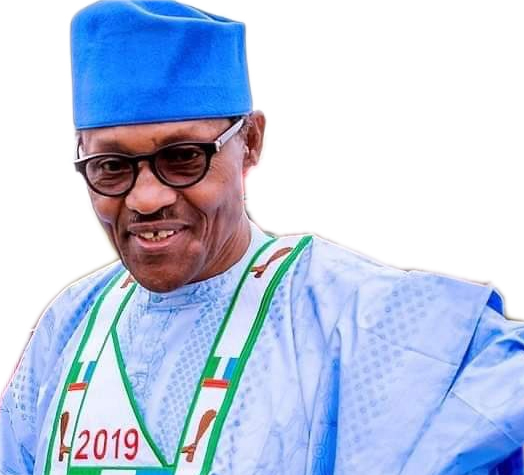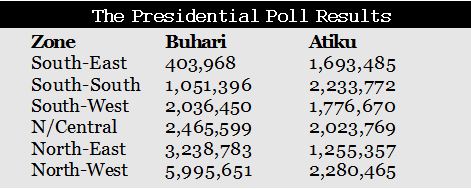ALTHOUGH he got fewer votes than he did in 2015, President Muhammadu Buhari secured enough votes at the February 23 presidential poll to be handed a re-election certificate. With 15, 191,847 votes, which is 3,928,969 votes higher than the 11,262,978 votes that his closest challenger, Alhaji Atiku Abubakar of the Peoples Democratic Party, PDP scored, President Buhari was returned as the winner of the election by the Independent National Electoral Electoral Commission, INEC , Chairman, Professor Mahmood Yakubu. In 2015, he got 15,424,921 votes and beat Dr Goodluck Jonathan of the PDP with 2.7 million votes.

BUHARI
How he won As the results of the poll were being collated, it became clear that Buhari was headed for victory. Reason: He retained his strong hold in North-West and most parts of the North-East, won the North-Central, the South-West and made appreciable in-roads in the South-East and South-South, which are the strong holds of the PDP.
In-road in the South-South and South-East
According to the results, he polled 403,968 votes in the South-East, which was more than double what he got in 2015. His performance in the South-South, where he got 1.05 million votes is unprecedented. He had never got up to 500,000 votes in the South-South zone in his previous four attempts.
Why he won Northern support
Buhari’s support-base and popularity in the North also played crucial roles. He recorded landslide victories in North-West and North-East, which gave him over six million votes, while edging out Atiku in the North-Central. Some pre-poll permutations gave the North-Central to Atiku.
READ ALSO: My victory divine, unity of Nigeria sacrocant , says Senator Wamakko
Sources attributed Buhari’s performance in the North to his popularity and achievements. In the last three -and-a half years of his administration he considered to have taken care of the North via appointments, and projects among. Faced with the choice between Buhari and Atiku, many northern voters chose Buhari. A source said that Atiku’s restructuring campaign and perceived pro-South inclinations would hurt the region.

Permutation for 2023
One of the avalanche of factors that shaped the outcome of the presidential election is permutation for 2023. The issue of the presidency going to the South-East or South-West in 2023 was one of the promises made at the presidential campaigns and town hall meetings of the APC. There is also the understanding that Atiku Abubakar would do a term so that power could rotate to the South-East, where his running mate, Mr. Peter Obi, hails from. Apart from the South-East and South-West, there are hordes of politicians all over the country, who are angling for the presidency. These politicians supported Buhari, who is seen as the shortest path to the throne. Some of these politicians across the country calculate that with Buhari, the coast would be clear for them in 2023 because he would not be standing for election again. This is more so as the APC does not have power rotation in its constitution. A member of the last National Conference organised by the immediate past President Goodluck Jonathan Administration, said northern power brokers want the North to keep the presidency for 12 years because in the last 20 years of democratic rule, the South ruled for 14 years. The North wants 12 years at a stretch to compensate for the three terms that the South had since the return of civil rule in 1999 through Chief Olusegun Obasanjo (eight years) and Dr. Goodluck Jonathan (six years). However, those angling for power shift to the South-East, said the zone deserves to be brought into the Nigerian equation in the interest of national cohesion and equity. Unarguably, the South-East is the most marginalised in terms of power sharing in Nigeria’s 59 years history as an independent country. The zone held power for six months during the military regime of late Major General Aguiyi Ironsi. South-East is followed by North-East (5 years and three months through late Sir Tafawa Balewa, who was prime minister from 1960 to 1966); and South-South (six years through Dr Goodluck Jonathan). The most favoured zones are North-Central, which occupied the topmost seat for 18 years and five months through Generals Yakubu Gowon, Ibrahim Babangida and Abdulsalami Abubakar; North-West, 17 and a half years, through General Murtala Muhammed, Alhaji Shehu Shagari, Buhari,late General Sani Abacha, and late Dr Umaru Musa Yar’Adua; and the South-West through General Olusegun Obasanjo and Chief Ernest Shonekan. Currently, the North has held power for 41 years and three months while the South has been in the saddle for 17 years nine months. Will South-East or South-West get the presidency in 2023 after Buhari? This question will be answered with time.

BUHARI
How he won As the results of the poll were being collated, it became clear that Buhari was headed for victory. Reason: He retained his strong hold in North-West and most parts of the North-East, won the North-Central, the South-West and made appreciable in-roads in the South-East and South-South, which are the strong holds of the PDP.
In-road in the South-South and South-East
According to the results, he polled 403,968 votes in the South-East, which was more than double what he got in 2015. His performance in the South-South, where he got 1.05 million votes is unprecedented. He had never got up to 500,000 votes in the South-South zone in his previous four attempts.
Why he won Northern support
Buhari’s support-base and popularity in the North also played crucial roles. He recorded landslide victories in North-West and North-East, which gave him over six million votes, while edging out Atiku in the North-Central. Some pre-poll permutations gave the North-Central to Atiku.
READ ALSO: My victory divine, unity of Nigeria sacrocant , says Senator Wamakko
Sources attributed Buhari’s performance in the North to his popularity and achievements. In the last three -and-a half years of his administration he considered to have taken care of the North via appointments, and projects among. Faced with the choice between Buhari and Atiku, many northern voters chose Buhari. A source said that Atiku’s restructuring campaign and perceived pro-South inclinations would hurt the region.

Permutation for 2023
One of the avalanche of factors that shaped the outcome of the presidential election is permutation for 2023. The issue of the presidency going to the South-East or South-West in 2023 was one of the promises made at the presidential campaigns and town hall meetings of the APC. There is also the understanding that Atiku Abubakar would do a term so that power could rotate to the South-East, where his running mate, Mr. Peter Obi, hails from. Apart from the South-East and South-West, there are hordes of politicians all over the country, who are angling for the presidency. These politicians supported Buhari, who is seen as the shortest path to the throne. Some of these politicians across the country calculate that with Buhari, the coast would be clear for them in 2023 because he would not be standing for election again. This is more so as the APC does not have power rotation in its constitution. A member of the last National Conference organised by the immediate past President Goodluck Jonathan Administration, said northern power brokers want the North to keep the presidency for 12 years because in the last 20 years of democratic rule, the South ruled for 14 years. The North wants 12 years at a stretch to compensate for the three terms that the South had since the return of civil rule in 1999 through Chief Olusegun Obasanjo (eight years) and Dr. Goodluck Jonathan (six years). However, those angling for power shift to the South-East, said the zone deserves to be brought into the Nigerian equation in the interest of national cohesion and equity. Unarguably, the South-East is the most marginalised in terms of power sharing in Nigeria’s 59 years history as an independent country. The zone held power for six months during the military regime of late Major General Aguiyi Ironsi. South-East is followed by North-East (5 years and three months through late Sir Tafawa Balewa, who was prime minister from 1960 to 1966); and South-South (six years through Dr Goodluck Jonathan). The most favoured zones are North-Central, which occupied the topmost seat for 18 years and five months through Generals Yakubu Gowon, Ibrahim Babangida and Abdulsalami Abubakar; North-West, 17 and a half years, through General Murtala Muhammed, Alhaji Shehu Shagari, Buhari,late General Sani Abacha, and late Dr Umaru Musa Yar’Adua; and the South-West through General Olusegun Obasanjo and Chief Ernest Shonekan. Currently, the North has held power for 41 years and three months while the South has been in the saddle for 17 years nine months. Will South-East or South-West get the presidency in 2023 after Buhari? This question will be answered with time.
No comments:
Post a Comment